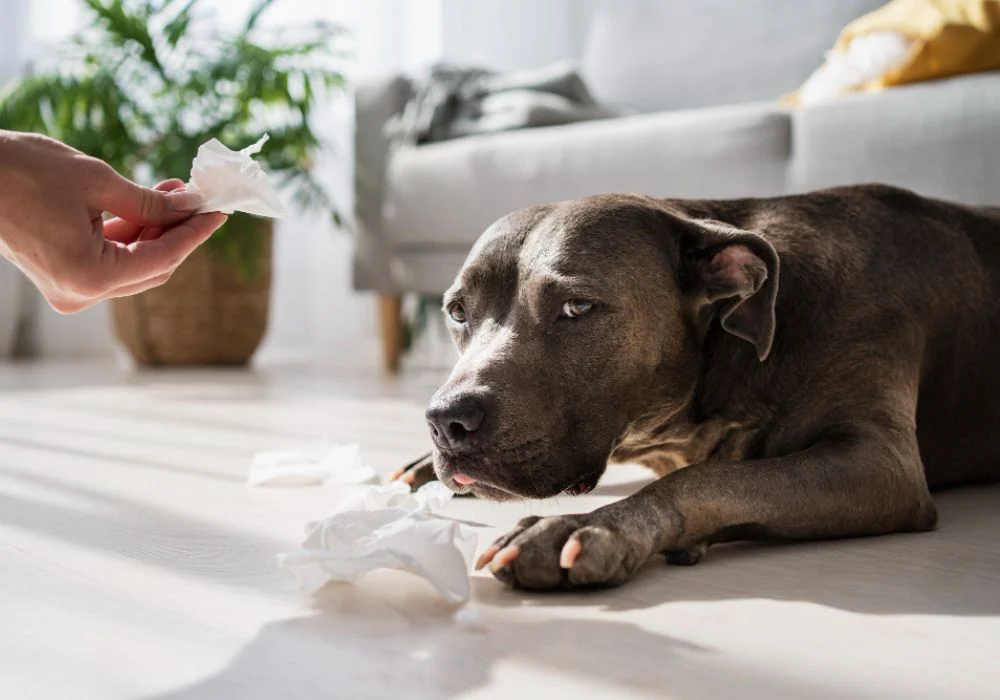Without the best dog allergy treatment, dogs’ life in danger. Did you know dog allergies affect 1 in 5 pets?
Your furry friend keeps scratching. Their skin looks red and irritated.
They seem miserable, and you feel helpless watching them suffer.
The constant itching affects their daily life.
But there’s good news.
Veterinarians now offer proven solutions. Modern treatments can stop the itching quickly.
What You’ll Learn:
- How to spot allergy symptoms fast.
- Top medical and natural remedies.
- Prevention tips that work.
- When to seek emergency care.
- Cost-effective home treatment options.
The right treatment can help immediately. Your dog doesn’t need to suffer.
This guide covers everything about pet allergy relief.
We’ll explore the best dog allergy medicine options and simple changes that make big differences.
Ready to help your itchy pup?
Let’s dive into the solutions that work.
Understanding Dog Allergies: Types and Symptoms
Many dogs get allergies. Dogs can feel itchy and sick from allergies like people.

Most dogs will scratch or bite their skin for allergies.
Dogs can get allergies at any age.
These are the four main types of things that make dogs itchy:
- Things in the air (like grass and dust)
- Food that upsets their stomach
- Fleas that bite them
- Things that touch their skin (like soap or grass)
Now that we know what can make dogs itchy, let’s look at how to spot these problems.
Common Types of Dog Allergies
Most dogs get allergies to things in the air. Some dogs get itchy during certain times of the year.
Some dogs get sick from their food. Other dogs get itchy when things touch their skin.
Here are the main types of allergies your dog might have:
- Outside allergies: When pollen and dust make them itchy
- Food allergies: When certain foods make them sick
- Flea allergies: When flea bites make them very itchy
- Skin allergies: When touching something makes them itchy
Each type of allergy needs a different treatment.
Finding out which type your dog has helps make them feel better faster.
Recognizing Allergy Symptoms in Dogs
Your dog might have more than one sign of allergies.
The sooner you spot these signs, the faster your dog can feel better.
Look for these signs that your dog might have allergies:
- Lots of scratching or licking
- Red, itchy skin
- Shaking their head or itchy ears
- Upset stomach (if they’re allergic to food)
- Sneezing or coughing
Keep track of when your dog gets itchy. Write down what it eats and where it plays.
This will help your vet determine what makes your dog itchy.
Best Dog Allergy Treatments
Your vet can give medicine to stop the itching. These treatments help your dog feel better fast.
Many dogs need different kinds of medicine.
Your vet will pick the best one for your dog.
Here are the main ways vets help itchy dogs:
- Pills that stop itching.
- Special shots that help with allergies.
- Shampoos that make skin feel better.
- Creams that help itchy spots.
Let’s look at each way to help your itchy dog feel better.
Antihistamines and Other Medicine
Dogs can take pills to feel better. These allergy medicines are like the ones people take.
Some pills work quickly, while others take a few days to help.
Here are the common medicines that help dogs with allergies:
- Benadryl: Helps with itching fast
- Zyrtec: Works well for many dogs
- Apoquel: Special medicine just for dogs
- Pain pills: Help if skin is very sore
Remember: These medications can be effective for some dogs and may not work for all dogs or all types of allergies.
Pro Tip: Always ask your vet before giving your dog any medicine.
They’ll tell you how much is safe for your dog.
Allergy Shots and Special Treatments
Some dogs need special shots to feel better. These shots help dogs become less itchy over time.
They work differently than regular medicine.
Here’s what you should know about allergy shots:
- They help stop allergies, not just itching.
- Your dog might need shots for several months.
- Many dogs feel much better after shots.
- They work best for outdoor allergies.
Your vet will test your dog first to see if shots will help them.
Special Shampoos and Skin Care
Dogs with itchy skin often need special baths.
These shampoos help stop itching and heal sore skin.
Some dogs feel better right after their bath.
Try these ways to help your dog’s skin:
- Use medicated shampoo from your vet.
- Give short baths (5-10 minutes).
- Keep skin clean and dry.
- Use warm (not hot) water.
- Pat dry gently with a soft towel.
Regular baths with the right shampoo help keep your dog comfortable and their skin healthy.
Natural and Home Remedies for Dog Allergies
Natural treatments help many itchy dogs. Home remedies are often safe for dogs.
Some work as well as medicine. Many pet owners prefer natural options.
Here are safe natural remedies that help itchy dogs:
- Coconut oil for dry skin
- Oatmeal baths to stop itching
- Apple cider vinegar for hot spots
- Fish oil for skin health
These natural solutions work differently for each dog. Let’s explore each option carefully.
Dietary Changes and Supplements
Food changes can stop dog allergies. The right diet helps heal itchy skin. Many dogs get better with good food. Special foods remove things that cause itching.
Try these diet changes to help your dog:
- Switch to grain-free food
- Add fish oil pills
- Give probiotics daily
- Use fresh ingredients
Watch your dog for two weeks after food changes. This shows if the new diet helps.
Herbal and Natural Treatments
Natural remedies are easy to use at home. Many herbs help stop itching. These treatments are gentle on dogs. Most natural options are safe.
These herbal treatments help itchy dogs:
- Chamomile spray for red skin
- Aloe vera gel for hot spots
- Green tea baths for itching
- Calendula cream for sores
Always test new treatments on a small spot first. This keeps your dog safe.
Making Your Home Allergy-Free
Clean homes help itchy dogs. Small changes make big differences. Your dog needs a safe space. Home care matters a lot.
Here’s how to make your home better:
- Use air filters
- Wash beds weekly
- Clean floors often
- Remove dust regularly
A clean home helps your dog stay healthy. Let’s look at more ways to stop allergies.
Prevention and Long-term Management of Dog Allergies
Prevention helps stop dog allergies early. Good daily care protects your dog. Simple steps make big changes. Many allergy problems can be stopped.
Here are key ways to prevent dog allergies:
- Daily skin checks
- Regular grooming routine
- Weekly deep cleaning
- Monthly vet checks
Let’s explore each way to help your dog.
Regular Grooming and Skin Care
Good grooming keeps dogs healthy. Clean skin means less itching. Brushing helps remove allergens. Your dog needs regular care.
Follow these grooming steps for healthy skin:
- Brush your dog daily
- Bathe every two weeks
- Check for red spots
- Clean ears weekly
- Trim nails regularly
Start grooming when dogs feel calm. This makes it easier for everyone.
Allergy Testing and Watching
Allergy tests find what hurts your dog. Your vet can run simple tests. Regular checks catch problems early. Quick action stops bad reactions.
Watch for these important signs:
- New itchy spots
- Changes in eating
- Different sleeping habits
- More scratching times
- Unusual behavior
Tell your vet about any new signs. Early help works best.
Creating a Safe Home Space
Safe spaces help dogs feel better. Small changes make homes safer. Clean rooms stop allergies. Your dog needs clean areas.
Try these home safety tips:
- Use pet-safe cleaners
- Wash pet beds weekly
- Vacuum floors daily
- Keep windows closed
A clean home helps stop allergies. Let’s look at emergency care next.
Emergency Care and Vet Help for Dog Allergies
Bad allergies need fast vet help. Some allergy signs show danger. Quick action saves dogs. You must know these signs.
Here are dangerous signs to watch for:
- Very hard breathing
- Sudden face swelling
- Extreme scratching wounds
- Bad stomach problems
Let’s learn when to get help.
Warning Signs of Bad Reactions
Severe reactions happen very fast. Some signs mean big trouble. Your dog needs quick help. Watch your dog closely.
Look for these emergency signs:
- Can’t stop scratching
- Breathing problems get worse
- Face or throat swells
- Throws up many times
- Very tired or weak
Call your vet when signs look bad. Fast help keeps dogs safe.
Finding the Right Vet Help
Good vets know about dog allergies. Some vets are allergy experts. Choose help very carefully. Your dog needs special care.
Follow these steps to find help:
- Ask about allergy experience
- Check vet reviews
- Look for emergency hours
- Find nearby clinics
- Ask about costs
Keep your vet’s number handy. Good care helps dogs recover.
Making an Emergency Plan
Quick plans save dogs’ lives. Keep important things ready. Know what to do. Stay calm always.
Here’s your emergency checklist:
- Save vet phone numbers
- Keep medicine handy
- Know the nearest emergency clinic
- Have the travel cage ready
Being ready helps save lives. Keep this guide close by.
Frequently Asked Questions About Dog Allergies
Q: What is the most effective treatment for dog allergies?
A: Apoquel stops itching within 24 hours. It targets specific immune system paths. Most vets recommend it first.
Q: How can I tell if my dog has allergies or something else?
A: Look for constant scratching and red skin. Watch for ear infections and stomach issues. Your vet can run special tests.
Q: Are there any natural remedies that work for dog allergies?
A: Oatmeal baths help soothe itchy skin. Fish oil reduces body inflammation well. Coconut oil helps dry, itchy spots.
Q: How long does it take to see results from allergy treatments?
A: Apoquel works within 24 to 48 hours. Natural remedies take about two weeks.
Q: What foods should I avoid if my dog has allergies?
A: Avoid beef, chicken, and dairy products. Watch for reactions to wheat too. Eggs can cause allergies in dogs.
Q: How much do dog allergy treatments typically cost?
A: Monthly treatments range from $50-$200. Insurance often helps cover these costs.
Q: Can I give my dog human allergy medicine?
A: Never give human medicine to dogs. It can harm your dog badly.
Q: How often should I bathe my dog with allergies?
A: Bathe every two weeks with medicine shampoo. Ask your vet for the right shampoo.
Conclusion
Your dog can live itch-free with proper care. Dog allergy treatments work fast when used correctly.
Start with a vet visit for proper testing. Try Apoquel for quick relief, or explore natural options like oatmeal baths.
Remember:
- Watch for allergy signs.
- Choose the right treatment.
- Stay consistent with care.
- Contact your vet if unsure.
Don’t let allergies control your pet’s life. Help is available and effective.

